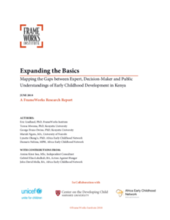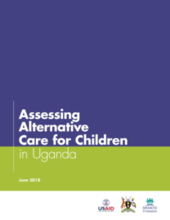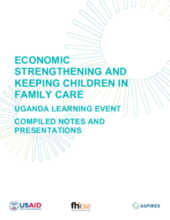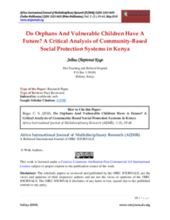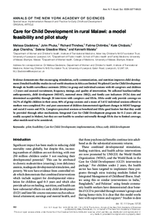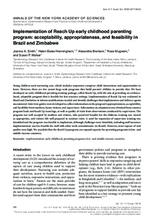Displaying 691 - 700 of 1617
This report considers a set of key overlaps and gaps in understanding of children’s early development and perception among experts, the Kenyan public, and people who work and make decisions in the early childhood development (ECD) sector in Kenya.
This report presents the findings from an assessment workshop aimed at informing action planning to address high-priority needs identified in alternative care for children in Uganda.
This report compiles presentations and notes from the Accelerating Strategies for Practical Innovation & Research in Economic Strengthening (ASPIRES) Family Care Uganda Learning Event, Economic Strengthening and Keeping Children in Family Care, held May 29-30, 2018.
For this study, forty men and women from five semi-rural villages in Meru County, Kenya participated in a Rapid Rural Appraisal to explore main and underlying reasons why children may be, or may feel, unwelcome in the home and thus migrate to the street.
This article explores main and underlying reasons for why children may be or may feel unwelcome in the home and thus migrate to the street.
This paper analyses the role of community-based child protection structures for the survival and development of orphans and vulnerable children.
This chapter looks at what the international law instruments recommend regarding the appointment of legal guardians. It provides an audit of the instruments which are applicable to the regulation of the appointment of legal guardians for children both at the global and regional levels.
This paper describes the piloting of Care for Child Development through six health surveillance assistants (HSAs) in group and individual sessions with 60 caregivers and children <2 years and assessed recruitment, frequency, timings, and quality of intervention.
This paper presents an evaluation of an early childhood parenting training package implemented in Brazil and Zimbabwe, called Reach Up, with the aim of providing an evidence‐based, adaptable program that is feasible for low‐resource settings.
The researchers in this study conducted formative research on mental health issues and HIV/STI risk behavior in Kasarani, a large slum in Nairobi, to guide the development of future interventions.

